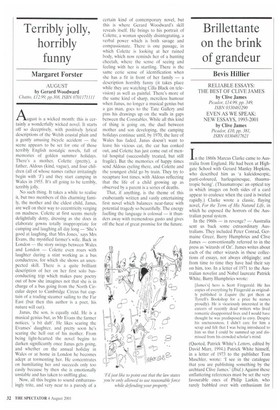Terribly jolly, horribly funny
Margaret Forster
AUGUST
by Gerard Woodward
Chatto, £12.99, pp.308, ISBN 0701171111
August is a wicked month: this is certainly a wonderfully wicked novel. It starts off so deceptively, with positively lyrical descriptions of the Welsh coastal plain and a gently amusing bicycle accident — the scene appears to be set for one of those terribly English nostalgic novels, full of memories of golden summer holidays. There's a mother, Colette (pretty), a father, Aldous (kind, vague), and four children (all of whose names rather irritatingly begin with T) and they start camping in Wales in 1955. It's all going to be terribly, terribly jolly.
No such thing. It takes a while to realise it, but two members of this charming family, the mother and the eldest child, Janus, are well on their way to eccentricity verging on madness. Colette at first seems merely delightfully dotty, dressing as she does in elaborate gowns totally inappropriate for camping and laughing all day long — 'She's good at laughing, that Mrs Jones,' says Mrs Evans, the mystified farmer's wife. Back in London — the story swings between Wales and London — Colette even roars with laughter during a stint working as a bus conductress, for which she shows an unexpected skill. There is a quite brilliant description of her on her first solo busconducting trip which makes pure poetry out of how she imagines not that she is in charge of a bus going from the North Circular depot to Cambridge Circus but captain of a trading steamer sailing to the Far East (but then this author is a poet, his nature will out).
Janus, the son, is equally odd. He is a musical genius but, as Mr Evans the farmer notices, 'a bit daft'. He likes scaring the Evanses' daughter, and pretty soon he's scaring the hell out of his mother. From being light-hearted the novel begins to darken significantly once Janus gets going, and whether on the annual holiday in Wales or at home in London he becomes adept at tormenting her. He concentrates on humiliating her and succeeds only too easily because by then she is emotionally unstable and has taken to sniffing glue.
Now, all this begins to sound embarrassingly trite, and very near to a parody of a certain kind of contemporary novel, but this is where Gerard Woodward's skill reveals itself. He brings to his portrait of Colette, a woman speedily disintegrating, a verbal power which is both savage and compassionate. There is one passage, in which Colette is looking at her ruined body, which now reminds her of a hunting cheetah, where the sense of seeing and feeling with her is startling. There is the same eerie sense of identification when she has a fit in front of her family — a description horribly funny (it takes place while they are watching Cilia Black on television) as well as painful. There's more of the same kind of sharp, merciless humour when Janus, no longer a musical genius but a gas man, goes to the Tate Gallery and pins his drawings up on the walls in gaps between the Constables. While all this kind of thing is going on, the duel between mother and son developing, the camping holidays continue until, by 1970, the lure of Wales has faded. Janus doesn't want to leave his vicious cat, the car has conked out, and Colette has just come out of mental hospital (successfully treated, but still fragile). But the memories of happy times send Aldous cycling there, and Colette and the youngest child go by train. They try to recapture lost times, with Aldous reflecting that the life of a child growing up as observed by a parent is a series of deaths.
That, if anything, is the theme of this exuberantly written and vastly entertaining first novel which balances near-farce with potential tragedy so beautifully. The energy fuelling the language is colossal — it thunders away with tremendous gusto and gives off the heat of great promise for the future.


























































 Previous page
Previous page